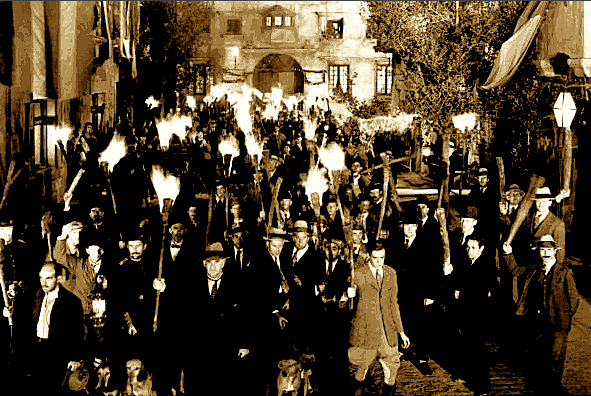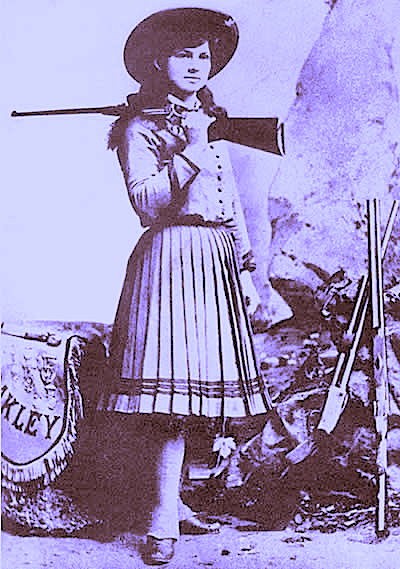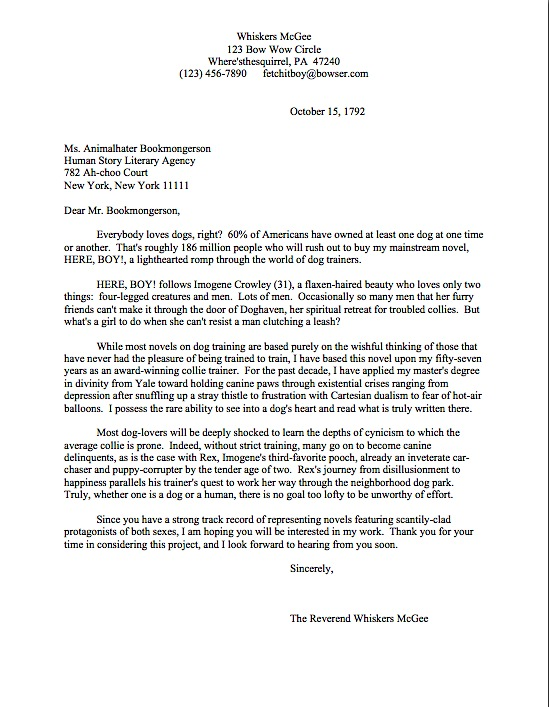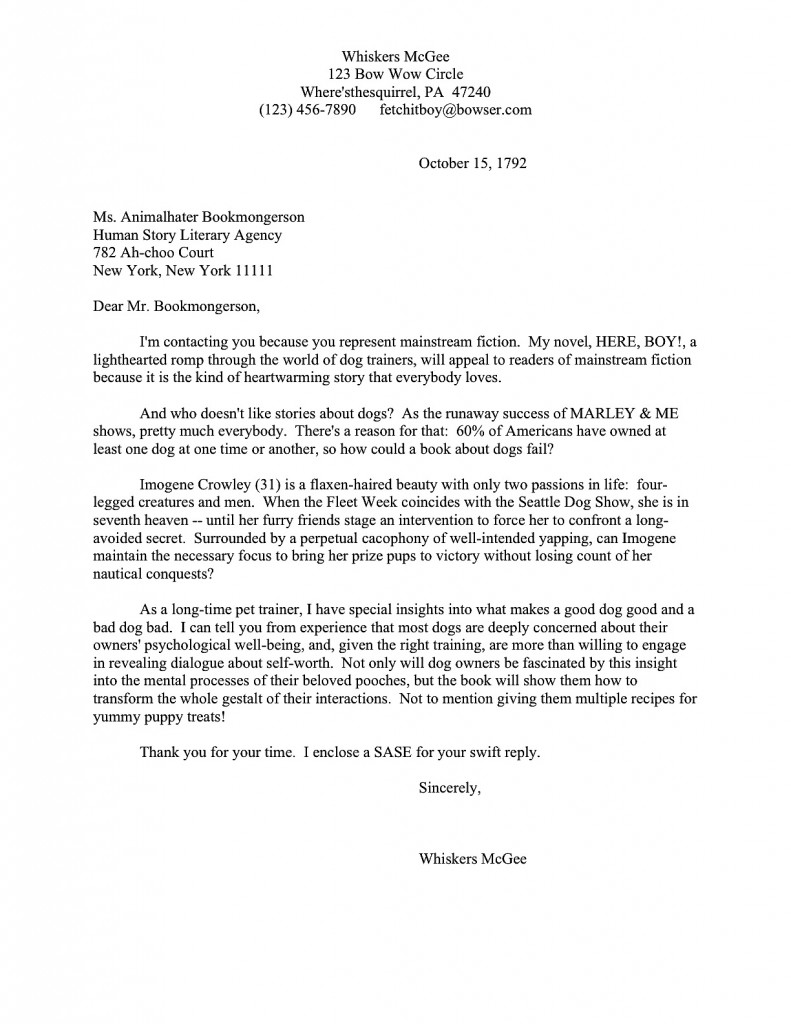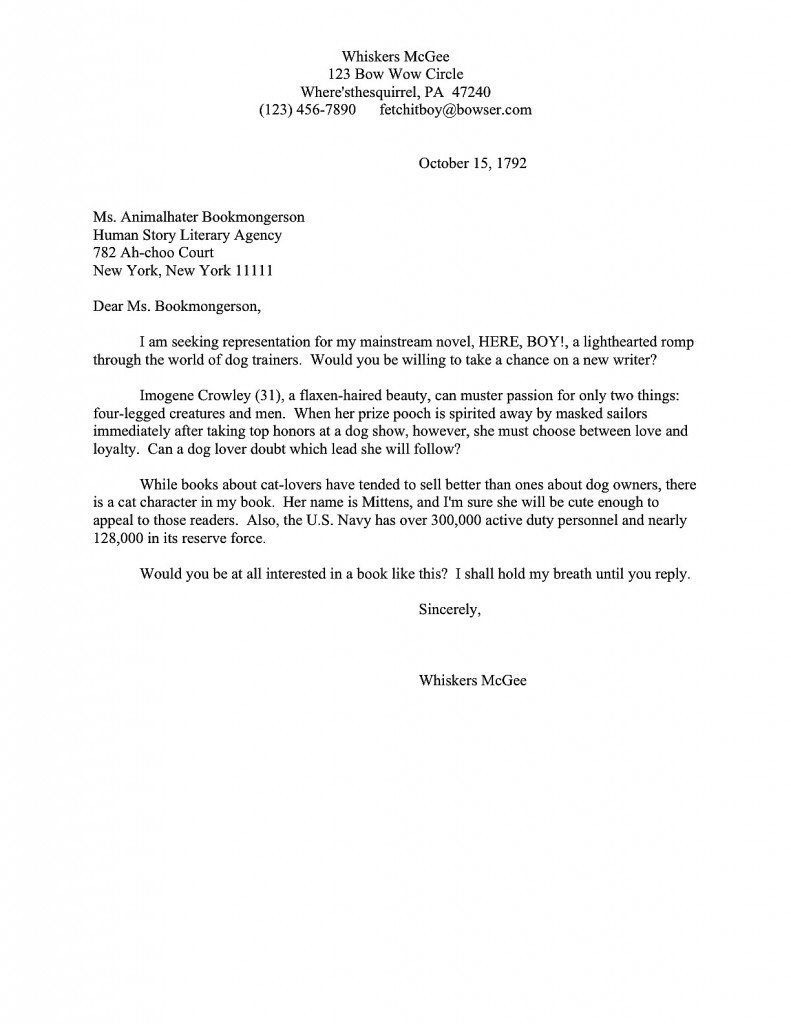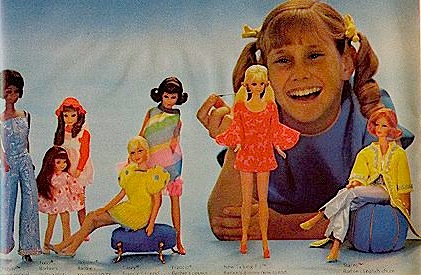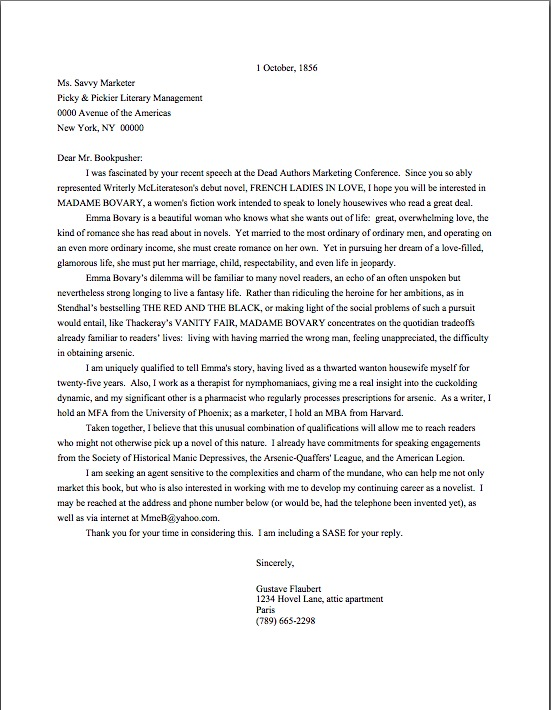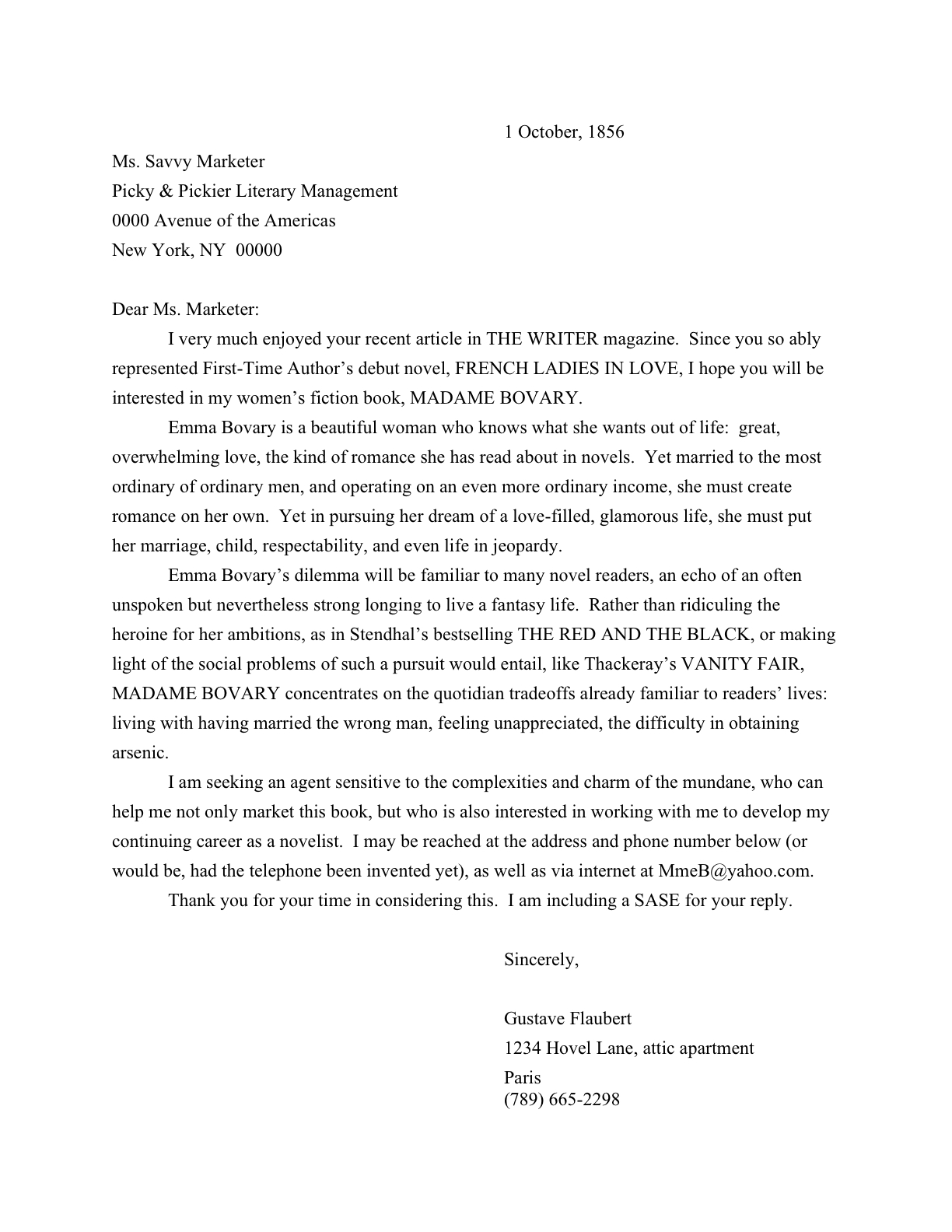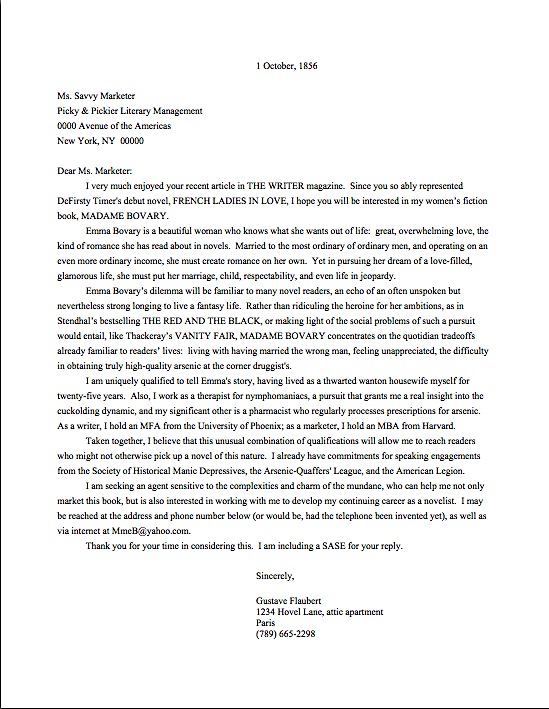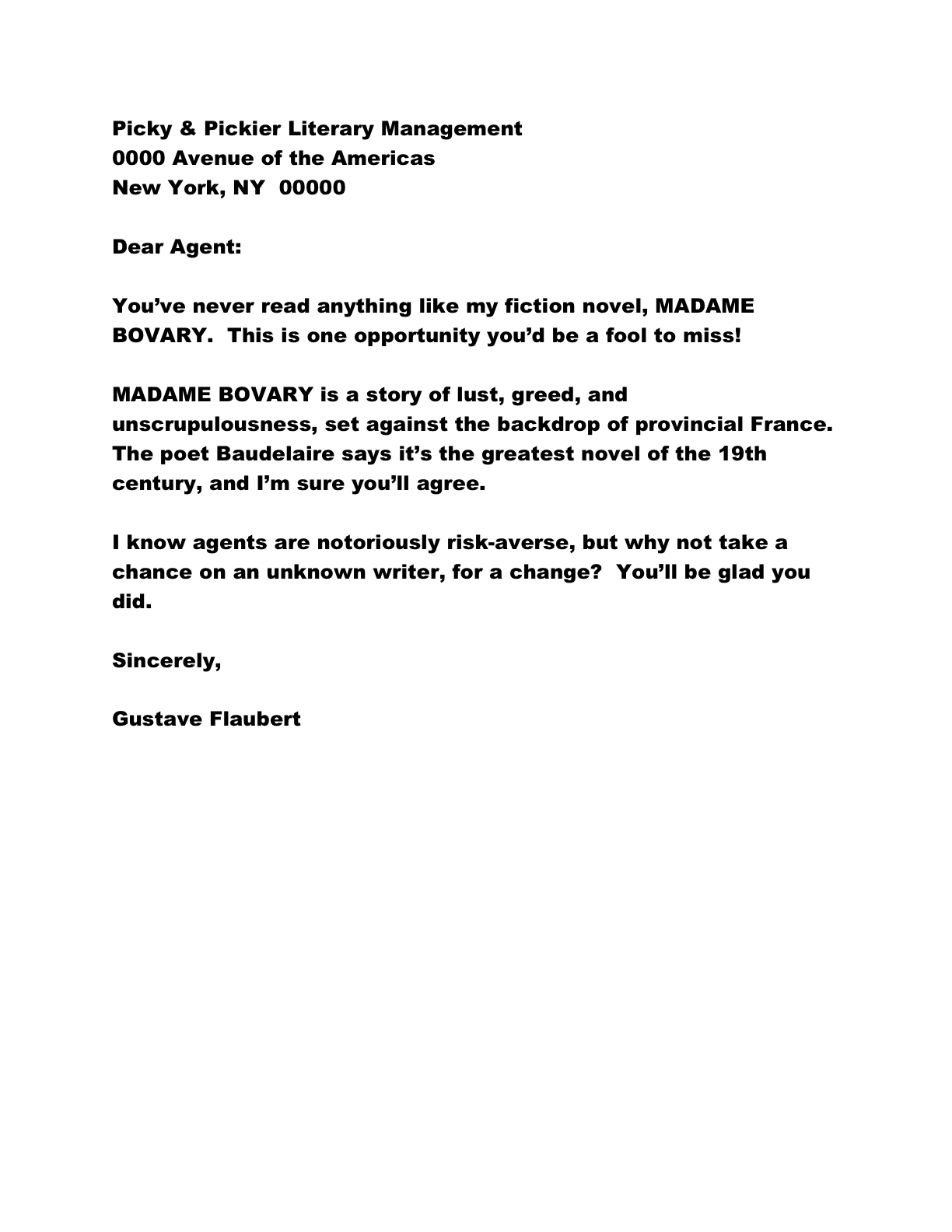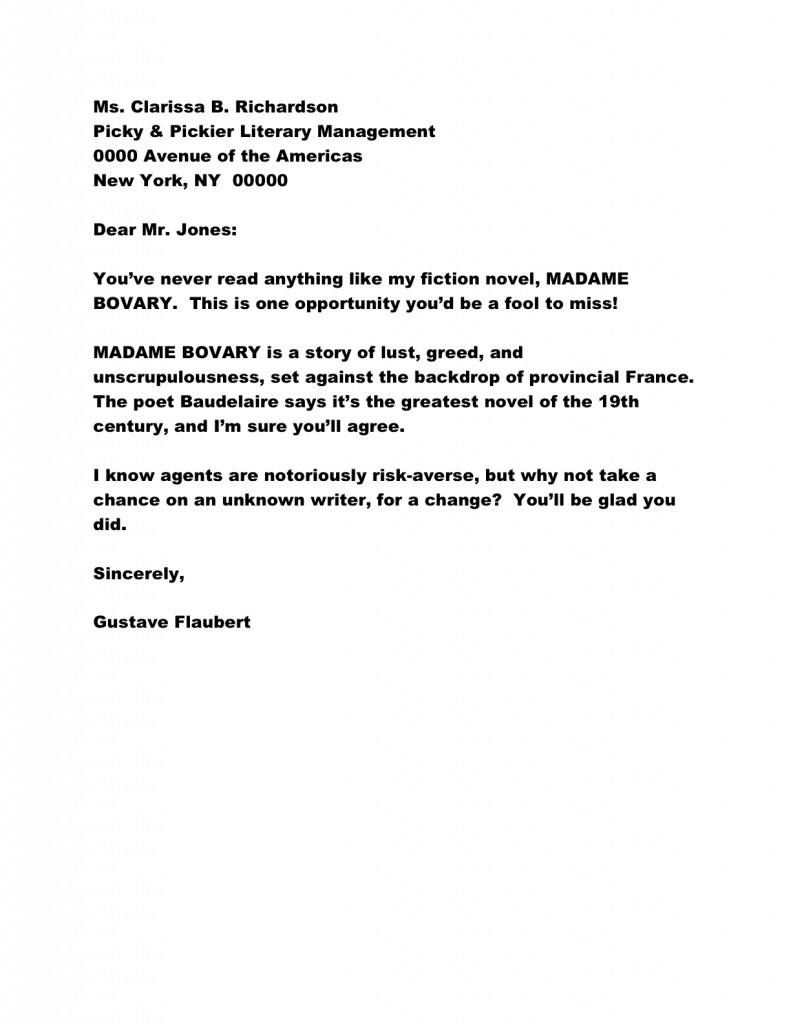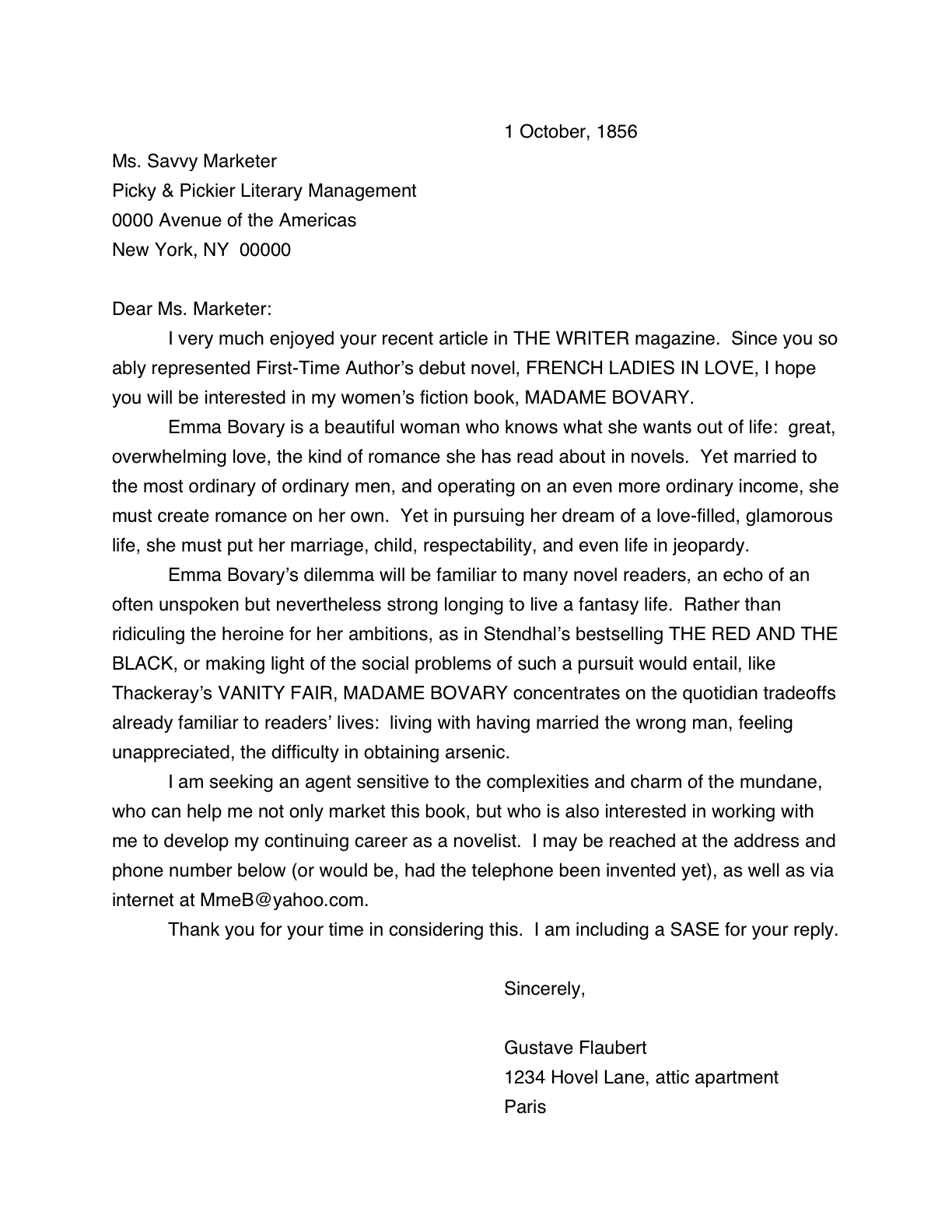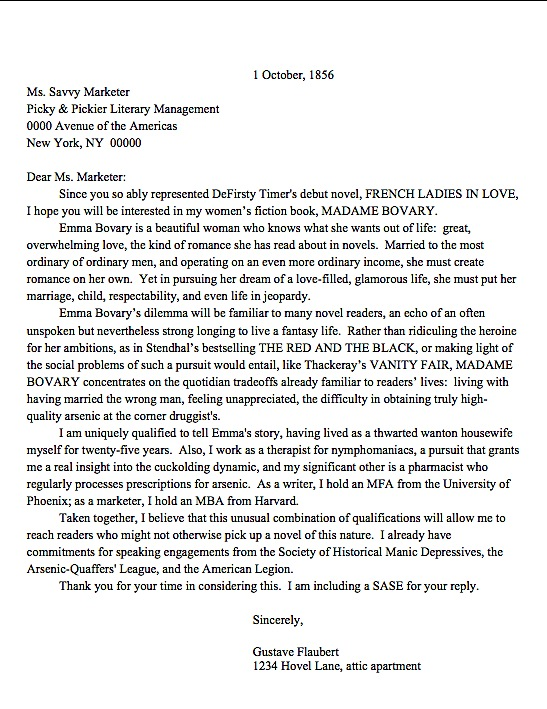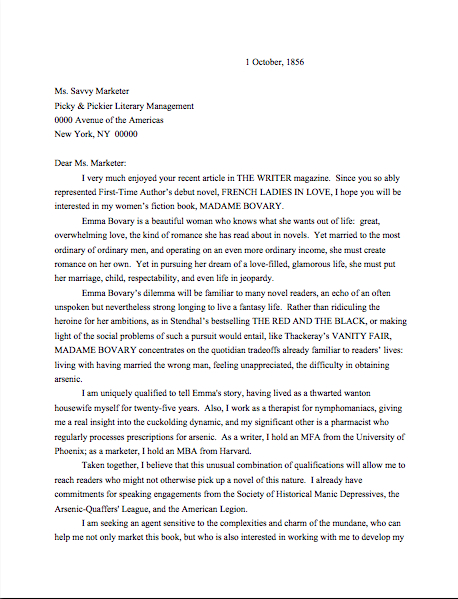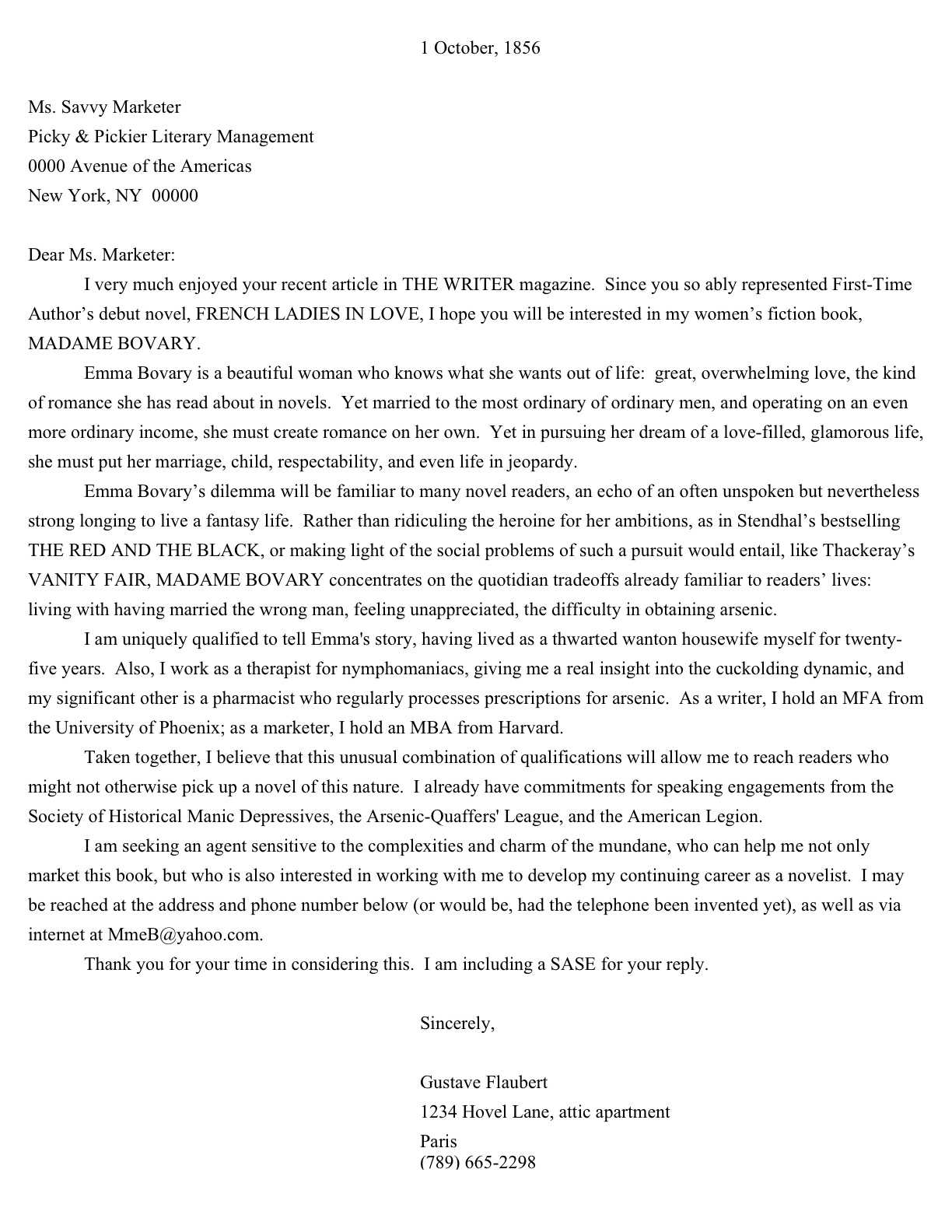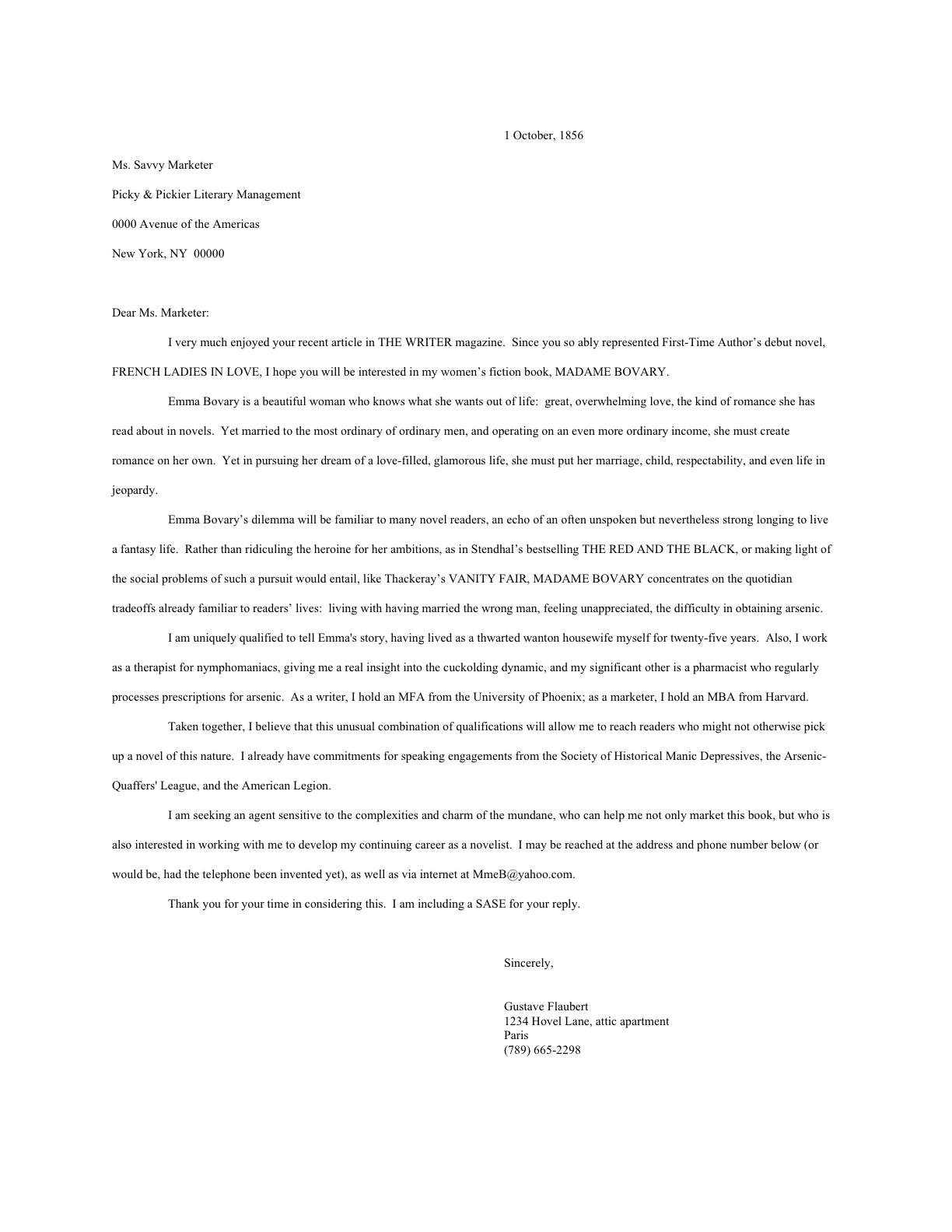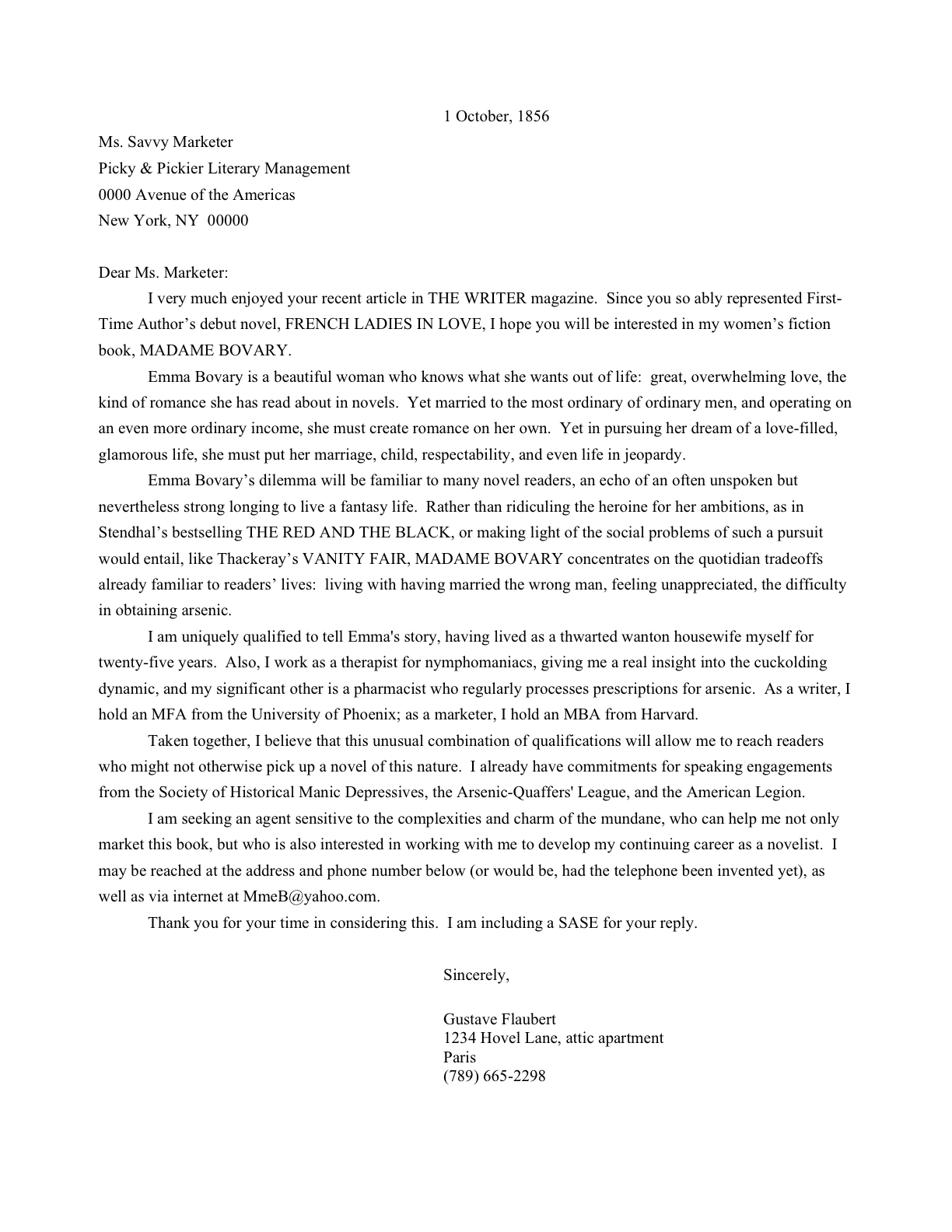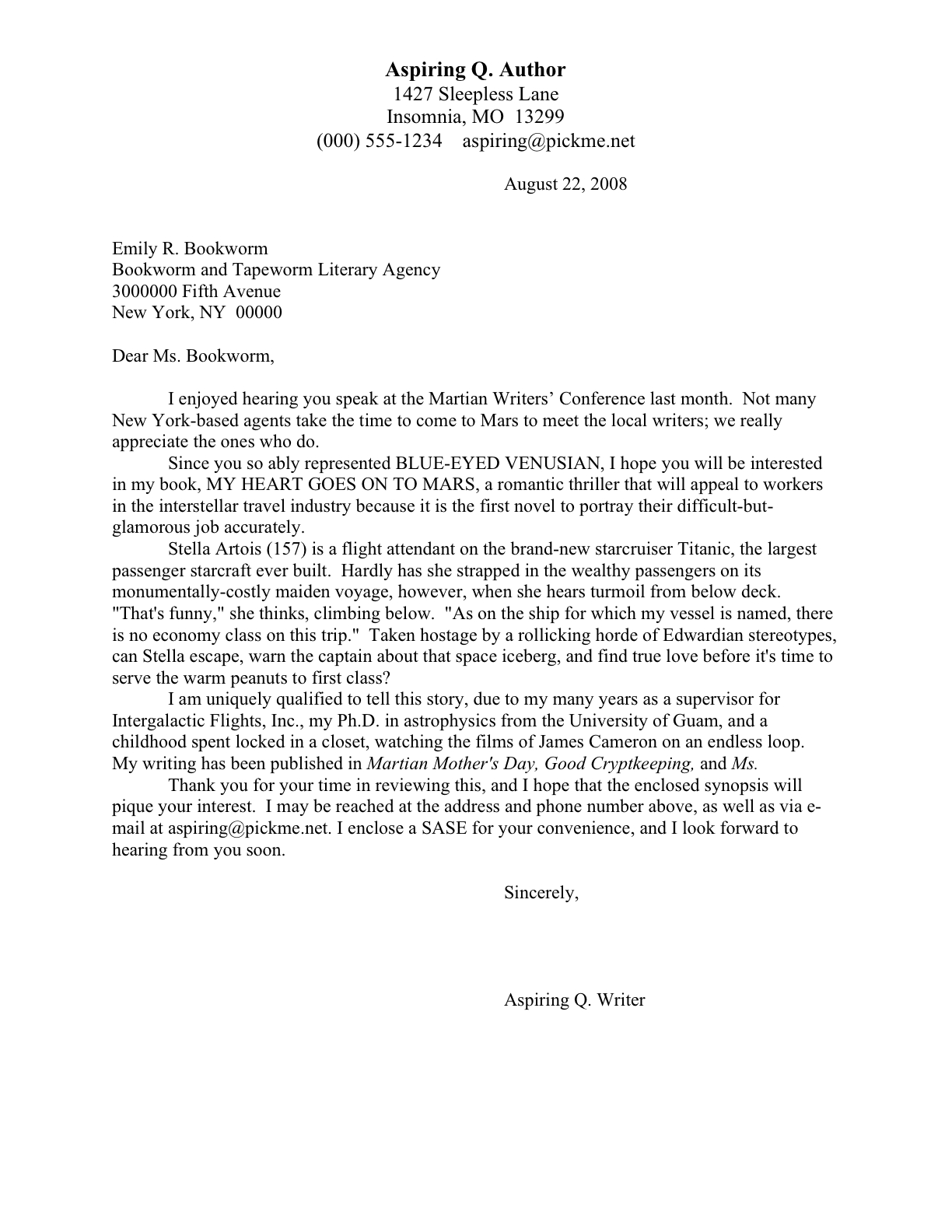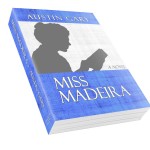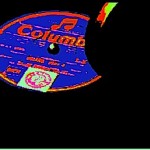Before I fling all of us headlong into yet another examination of what strategies do and do not work well on the query page — that’s why you tuned in tonight, right? — I’d like to take a moment to reiterate some advice I gave all of you eager New Year’s resolution queriers a couple of weeks back. Or, at least that hefty chunk of the January querying community that either lives in the United States, is planning to approach literary agents based in the United States, or both: no matter how tempting it may be to send out a query via e-mail over this long Martin Luther King, Jr., Day weekend, please, I implore you, resist the temptation.
“And why should I even consider taking that advice?” those of you joining us mid-Queryfest demand. “At the risk of pointing out the obvious, I have more spare time in the course of a three-day weekend than during the normal two-day kind. Why shouldn’t I hit SEND while I have the leisure to do it?”
Already, a forest of hands sprouts out there in the ether. I love how closely my readers pay attention. Go ahead and help me fill ‘em in, Queryfest faithful: just as our old pal and nemesis, Millicent the agency screener, is predictably greeted by many, many more queries on any given day in January, as opposed to any other month of the year, she also finds her inbox stuffed with more e-queries than usual on Mondays than any other weekday, for precisely the reason the newcomers just cited — aspiring writers tend to have more time to send them over the weekend. As a direct result, not only does she typically have more work on Mondays. And as she, like so many people bent upon enjoying their weekends, is often a mite grumpier that day as well.
With what result? Chant it with me, Queryfesters: the rejection rate tends to be higher on Monday mornings than, say, Thursday afternoons. Our Millie simply has a taller stack of queries to work through, without any extra time in which to do it. Fortunately for her sanity, while it’s pretty difficult to compress the amount of time it takes her to process a paper query — about 30 seconds, on average, or less if the querier is helpful enough to insult her intelligence with a hard-selling statement like you’ll be sorry if you pass this one up! or this is the next DA VINCI CODE! — it is spectacularly easy to render the consideration and rejection of an e-mailed query a matter of just a few seconds. Especially now that so many agencies have adopted the to-a-writer’s-eye appallingly rude practice of simply not responding to a query if the answer is no.
Not sure how to speed up the consideration process? Okay, I ask you: how much time would it take you to twitch the finger nearest the DELETE key in its general direction? And how much more likely would you be to do it on a morning when your bleary eyes fell upon 722 queries in your inbox than the happy day when it contained only 314?
So, at the risk of repeating myself, I ask you: do you honestly want your query to land on her computer screen on a Monday morning?
Sad to say, though, it could arrive at a worse time: the Tuesday following a three-day weekend. Due to the aforementioned tension between aspiring writers’ free time and the rhythm of her work week, we may also confidently predict that she will be inundated with still more e-queries then than she would on an ordinary Monday, right? Just after Labor Day, for instance, or Memorial Day, it requires very little imagination to picture just how itchy her fingertips are going to be for that DELETE key.
It thus follows as night the day, then, that when a three-day weekend happens to fall in January, the dreaded month when a good half of the aspiring writers in North America who intend to query this year will be hitting the SEND key if they are going to take the plunge at all, Millicent’s e-mail coffers and mail bag will be as full as she is ever likely to see them. Need I devote more screen space to the predictable effect upon the rejection rate the following Tuesday?
I’m guessing not, with a group as savvy as this. Hint, hint, wink, wink, say no more, as the immortal Eric Idle used to say.
Speaking of Millicent’s a.m. stress levels, mine hit a peak this morning, triggered by the gentle snowfall pictured above. Not that I am anti-snow in general; indeed, I typically find the first — and sometimes only — snow of the year quite exciting. It snowed a grand total of thrice in the Napa Valley in the course of my childhood; it was something of an event. I didn’t actually see large quantities wafting down from a grumpy sky until my junior year of high school, in the course of an ill-fated let’s-show-the-kids-how-Congress-works field trip during which I got pushed sideways over a chair because I was the only student participant who believed Social Security was worth saving. (Hey, it was the 80s. And my sprained ankle is fine now, thanks.)
So I was darned excited to look up from my desk this morning to see great, big white flakes hurtling at my window. I can only plead the fact that I happened to be editing a manuscript at the time as an excuse for what happened next.
My SO came tripping into my studio, bearing a hot cup of tea. “Have you looked outside? It’s a winter wonderland!”
“I should think it would be obvious,” I said, gratefully accepting the mug, “from the fact that I am sitting right next to a window that I might have observed the snow. And couldn’t you manage to come up with a less hackneyed way to describe it than winter wonderland?”
And that, dear friends, is what reading even quite good manuscripts for a living will do to an otherwise charming person’s manners: I am certainly not the only professional reader who automatically revises everyday speech in an attempt to raise its literary value. Imagine how much touchier I would be if I had Millicent’s job on a Monday morning.
Had I mentioned that you might want to think twice about hitting that SEND button this weekend? Wouldn’t your time be better spent building a snowman?
To be fair to both Millicent and myself, stock phrases, clichés, and stereotypes do abound in your garden-variety query, synopsis, and manuscript submission. So common are they that one might well conclude that there’s an exceptionally industrious writing teacher out there, working day and night to inculcate the pernicious notion that the highest goal of literary endeavor consists in stuffing narrative prose to the gills with the most repetitive, prosaic elements of everyday speech.
In a sense, that is sometimes the case: as many, many writers can attest, the continental U.S. has not suffered in the past half-century from a shortage of English teachers bent upon convincing their students that good writing should flow as easily as natural speech. The most visible results of this endeavor have been, as we have discussed before, a superabundance of chatty first-person narrators given to telling, rather than showing, the stories through which they lead their readers, a general disregard of subject/object agreement (presumably because the proper everyone and his Uncle George contracted rabies strikes the ear less gracefully than the pervasive but incorrect everyone and their Uncle George contracted rabies), and, most irritating of all to the professional reader corps, texts peppered with the kind of catchphrases and polite phrases that show up in conversation.
Why is that last one problematic? Well, think about it: by definition, the stock responses to common stimuli (pleased to meet you, have a nice day, I’m so sorry for your loss), standard phrases exchanged in mundane interactions (sign right here, have a nice day, may I help you?), and mere polite murmurings (after you, excuse me, you’re welcome) are generic; their strength — and their social safety — lies in the very fact that people spout these statements all the time. As such, they do not have personal content: although Madge may genuinely mean it when she tells Bernice to have a nice day, chances are that when she said precisely the same thing to Herbert, Bruce, Ambrose, and Melchior over the course of the following two hours, she did not utter it with the same intent. It’s just something people say.
We’re all aware of that conversationally, right? So why does it frequently come as a surprise to aspiring writers that because such phrases are so very common, they lack the power either to convey characterization, illuminate relationships, or add complexity to an interaction?
Not sure why? Okay, let’s assume that Madge’s co-worker, the otherwise estimable Ima, decides to immortalize their workplace’s everyday speech on the novel or memoir page. Eager to depict darling Madge as the courteous, considerate lady that she is, conscientious Ima makes darned sure to include each and every stranger-charming statement. Unfortunately, the result is not particularly likely to charm a reader, much less one as page-weary as Millicent. Take a gander at a not-atypical opening scene:
“Excuse me.” The tall, handsome stranger handed her his paperwork almost apologetically. “I was told to fill out these forms and bring them to this window.”
“Hello.” Deliberately, Madge finished reorganizing the paper clips in their magnetic holder before glancing at the stack. “How are you this fine Monday morning?”
“Oh, fine. Is this the right window for these?”
“Yes, of course. Hectic day?”
He covered his watch with his sleeve. “Oh, yes. We’ve been swamped.”
“Well, it’s always like that after a holiday.” She stamped the top three forms. “We’ve been swamped, too. Did you have a nice long weekend?”
“Yes. You?”
“It was fine. Didn’t they give you a B/49-J form?”
“Oh, yes, it’s right here. I’m in a bit of a hurry.”
“I’m doing my best, sir. May I see some I.D., please?”
“Okay.” Clearly, the man was accustomed to his smile’s having greater effect on functionaries. He could have posed for a toothpaste ad. “Here it is.”
“Thanks. Just a moment.” She tapped on her computer, frowning. “We don’t seem to have any record of your existence, Mr. Swain.”
“What do you mean?”
She caught just a glimpse of the tentacle wiping the perspiration from his brow. “I’m sure there’s just been a mix-up in the database. You just hang on for a moment, and I’m sure we can get this cleared up in a jiffy.”
Pretty stultifying until that last bit, wasn’t it? Even less excusable from Millicent’s perspective, the narrative didn’t give the slightest indication until that last paragraph that this is the opening for a fantasy. While this sort of bait-and-switch between the ordinary and the unexpected is a classic short story plotting strategy — not to mention the dominant storytelling technique of the old Twilight Zone series, which continues to influence fantasy writers to this day — the speed with which the sheer volume of submissions forces Millicent to read renders the mundanity of this dialogue dangerous. She would have to read all the way to the end of this exchange to see that it’s not just the 274th exchange echoing everyday speech that she’s read this week.
Lest anyone be tempted to dismiss her tendency to lump this interaction with all the others (including issuing the same cry of, “Next!”), note, please, just how little those polite, ordinary speeches reveal about either of the characters shown or the situation. This dialogue could take place in any customer service environment: in a bank, at the DMV, at the teleport terminal between Earth and the planet Targ. Because these statements are generic, they can’t possibly tell the reader anything specific. And while the writer and his writing group might well find that keep-‘em-guessing ambiguity hilarious, Millicent’s simply seen it too often to play along for very many lines.
Does the chorus of martyred sighs out there indicate that some of you Queryfesters are tiring of playing along as well? “Okay, I get it, Anne,” those of you impatient to get queries out the door moan, “dialogue on the page needs to be something better than just a transcript of everyday speech. Lesson learned. But why in the name of the seven purple moons of Targ did you decide to stop dead in the middle of a series on querying to tell us about this Millicent-irritant now?”
An excellent question, impatient moaners, and one that richly deserves a direct answer. Try this one on for size: since Millicent, like most professional readers, has an extremely low cliché tolerance, it’s poor strategy to include even one stock phrase in a query letter.
And yes, in response to what half of you just thought very loudly indeed (the mind acoustics are phenomenal here on Targ), she sees cliché-filled queries all the time. See for yourself — and, as always, if you are having difficulties reading the individual words, try holding down the COMMAND key and pressing + several times to enlarge the image.
Oh, you thought I was going to use a real reader’s query to illustrate this particular faux pas? That would have been a bit on the cruel side, wouldn’t it? Besides, given a readership as savvy, fascinating, and creative-minded as this one, where could I possibly have found a query as cliché-ridden as this one?
Actually, although it pains me to say it, about a quarter of the volunteer queriers submitted letters containing one or more of Ima’s hackneyed phrases; although our fictional exemplar here is inordinately fond of them, you’d be astonished at how many real queries contain roughly this ratio of stock phrase to original writing. Odd, isn’t it, considering that as every syllable an aspiring writer sends an agency is a writing sample (you hadn’t been thinking of your query in those terms, had you?), that so many queriers would rush to make themselves sound exactly like everyone else?
Incidentally, about one in six of the queries I received from would-be volunteers also replicated a particular phrase in Ima’s letter — and that surprised me, because this all-too-common statement contains two elements that I frequently and vehemently urge Author! Author! readers not to include in their queries at all. Did you catch it?
No? Would it help if I mentioned that at most agencies, one of the deadly elements would render this query self-rejecting?
If your hand shot into the air at that last hint because you wanted to shout, “I know! I know! It’s because Ima said in the first paragraph that every reader currently walking the planet Earth — if not the planet Targ — would be interested in this book! From Millicent’s perspective, that’s a completely absurd claim, as no book appeals to every reader,” give yourself a pat on the back, but not a gold star. Yes, this particular (and mysteriously popular) assertion does tend to irritate most Millicents (especially on the Tuesday after a long weekend, when she will see many iterations of it), but it’s not always an instant-rejection offense.
No, were that boast the only faux pas here, Millicent probably would have kept reading until after the third or fourth unoriginal phrase. I seriously doubt, though, whether she would have made it past Ima’s first sentence. Any guesses why?
If your eye immediately pounced upon the phrase complete at 137,000 words, feel free to ransack the gold star cabinet. Why is this phrase — lifted directly from some maddeningly pervasive template floating around out there on the Internet, I gather — a rejection-trigger? It’s not, believe it or not, the fact that so many aspiring writers have been shoehorning it into their queries in recent years that it has effectively become a cliché, as far as Millicent is concerned. The real problem with it that it effectively bellows at Millicent, “Hey, lady — this querier does not know thing one about how books are sold in the U.S.”
An unfairly sweeping conclusion? Perhaps, but let’s don Millicent’s glasses and whip out her text-dissecting scalpel to figure out why she might leap at it. In the first place, this statement includes unnecessary information. If the book being queried is fiction, people in agencies will assume that the manuscript is complete, for the exceedingly simple reason that it would be impossible for a first-time, non-celebrity writer to sell an incomplete first novel. Fiction is sold on a completed manuscript, period.
Nonfiction is typically sold on a book proposal, not a full manuscript, so were Ima’s book a memoir, including the information mentioning that the manuscript is complete would not necessarily be a selling point, either. The only exception: the relatively rare nonfiction-representing agency that states point-blank in its submission requirements that it will consider a first memoir only if the writer has already completed a draft of it.
Why might they harbor that preference? Ask any memoirist: writing truthfully and insightfully about one’s own life is hard, doubly so if the life in question has been at all traumatic. The brain and the body often doesn’t make a huge distinction between living through something difficult and reliving it vividly enough to write about it explicitly and well. It’s not at all unusual for even an exceptionally talented writer to become heavily depressed, or even physically ill, in the course of fulfilling a contract for a memoir.
Since most of pulling together a proposal involves writing about the book’s subject matter, rather than writing the story from within — telling what happened, as opposed to showing it clearly enough that the reader feels as though she’s walking around in the narrator’s skin — many first-time memoirists worry, and rightly, that they might not have the emotional fortitude to finish the book. Others are stunned to discover that after months or years of effort aimed at landing an agent and selling the book concept to a publisher, they simply cannot bring themselves to complete it. Or, if they do, they balk at exposing their innermost secrets to the world.
There’s absolutely no shame in any of that — second thoughts are natural in this instance. However, an agent who has seen a pet project cancelled at the last minute because a client could not finish the book he was contracted to deliver might well become wary about running into the same problem in future. So while agencies that handle a lot of memoir tend to get inured to this sort of disappointment, it’s not at all unheard-of for a newly-burned agent or agency to establish a full manuscript-only policy.
Most of the time, though, that’s not the expectation; publishers buy memoirs all the time based solely upon a proposal packet and a single chapter. But they don’t, as a rule, buy incomplete fiction.
So when Ima makes a point of saying in her query — and right off the bat, too — that her manuscript is complete, probably merely because she saw an example online that used that phrase, she is effectively making a virtue of having lived up to the publishing industry’s minimum expectation of fiction writers. To Millicent’s mind, that’s just not something anyone familiar with how fiction is actually sold in this country would do.
But as much as most agents prefer to take on new clients who have done their homework about how publishing does and does not work, professional naïveté all by itself is seldom considered an instant-rejection offense. That unusually high word count, however, often is. In fact, many Millicents are explicitly trained to reject a query that mentions the manuscript it is promoting exceeds 100,000 words.
Why draw the line there? Cost, mostly. Although the average manuscript shrinks in length by about 2/3rds in the transition to print, it’s just far more expensive to print a long book than a shorter one. Since the publication costs rise astronomically at about 125,000 words — different binding is necessary, and trade paper binding is more problematic — and it’s so common for first-time authors to be asked to revise their books and add pages prior to publication, they like to leave themselves some wiggle room.
So pervasive is the prejudice against first books over 100,000 words (i.e., 400 pages in Times New Roman) that it’s not unheard-of for agents to tell clients with books pushing the upper limit simply to leave the word count off the title page. (If you were not aware that the word count is typically included on a professional title page, or that a title page is necessary for a manuscript, run, don’t walk to the HOW TO FORMAT A TITLE PAGE category on the archive list at right.)
Did some of you do a double-take at the 100,000 words = 400 pages equation? “But Anne,” Ima cries, justifiably upset, “my manuscript is nowhere near 400 pages. But it is about 137,000 words. What gives?”
I’m guessing that you have been using actual word count, Ima, not estimated. For short stories and articles, it’s appropriate to report what Word says your word count is, but for books, that’s not historically how it has been figured. And unfortunately for your query, Millicent will just assume that any word count that ends in a zero is an estimate.
Actually, she’s likely to leap to that conclusion, anyway, because that’s how word count for books has historically been figured: 250 x # of pages for Times New Roman, 200 x # of pages for Courier. Yes, yes, I know, Ima: the resultant figure will bear almost no resemblance to the actual word count. That’s fine — expected, even.
But that expectation does carry some pretty heavy implications for using the stock phrase complete at X words, necessarily. Specifically, when Millicent spots your query’s assertion that your manuscript is 137,000 words, she — and a potential acquiring editor — will just assume that your novel is 548 pages long. (137,000 divided by 250.) And that, as we discussed above, would place it well beyond what her boss, the agent of your dreams, could hope to sell as a first book in the current fiction market.
“But Anne,” Ima protests, tears in her eyes, “I see plenty of fantasy novels that long in the bookstore. Because, yes, I am one of those great-hearted and sensible aspiring writers who realizes that if I expect bookstores to help promote my novel when it comes out, I should be supporting them now by buying books from them.”
While I approve of your philosophy, Ima — and would even upgrade it by pointing out that an aspiring writer who does not regularly buy recently-released first books in her own book category is shooting her own long-term best interests in the metaphorical foot — what you probably have in mind are novels by established authors. What a writer with an already-identified readership demonstrably willing to buy his books can get away with often differs radically from what a first-time author can hope to sneak past Millicent. And because market conditions change, it’s certainly different from what a first-time author might have been able to sell five years ago.
It’s a truism, to be sure, but people in the industry repeat it for a reason: in order to get discovered, a new writer’s work doesn’t merely have to be as good as what is already on the shelves; typically, it needs to be better.
Now, an aspiring writer can find that truth discouraging — apparently I’ve depressed poor Ima into too deep a stupor to keep formulating questions — or she can choose to find it empowering. Yes, that stock phrase gleaned from an online query template led Ima down the path of certain rejection, but honestly, can you blame Millicent and her ilk for wanting to reject queries crammed with prefab, one-size-fits-all phrasing?
Be honest, now: if you were an agency screener, wouldn’t you prefer to reward queriers who made the effort to sound like themselves?
Of course, it’s quite a bit more work to come up with original phrasing for what most aspiring writers regard, let’s face it, as merely an annoying hoop through which they have to jump in order to get agents to read their manuscripts. It’s more than that, though — to Millicent, it’s your first opportunity to wow her with the originality of your voice, the startling uniqueness of your story or argument, and, yes, your professional grasp of the realities of publishing.
Listen: every piece of writing you send to an agency is yet another opportunity to demonstrate that you can write. Millicent wants to see your literary voice on the page, not other people’s phrasing, and certainly not a pale echo of what anybody random person on the street might say. (I’m looking at you, Madge.) Read your query carefully to make sure that you sound like you and nobody else — and that the story you are telling or the argument you are making doesn’t read like anybody else’s, either.
A tall order? Most assuredly. But isn’t this what a good writer wants, people in the publishing industry taking her writing seriously enough to pay close attention to how she chooses to arrange words on the page?
Ponder that, please, until next time, when I shall once again be analyzing a reader’s actual query. Have the confidence to eschew those templates, everybody, and keep up the good work!

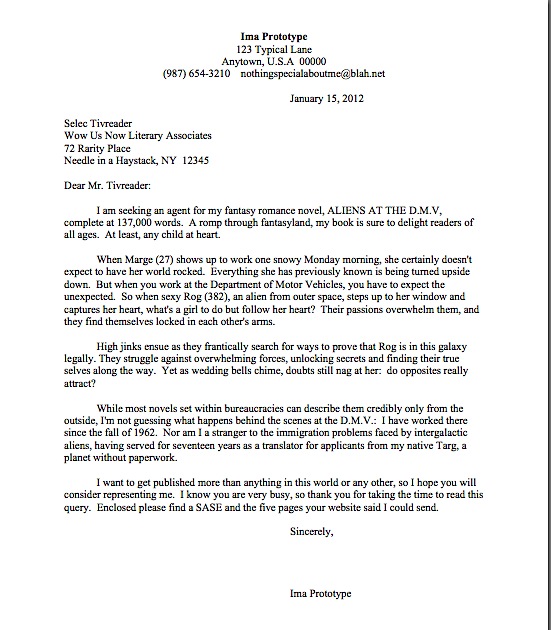


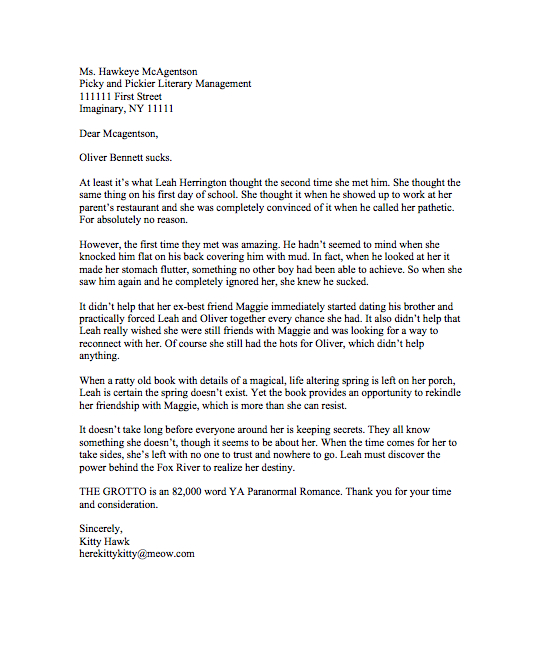
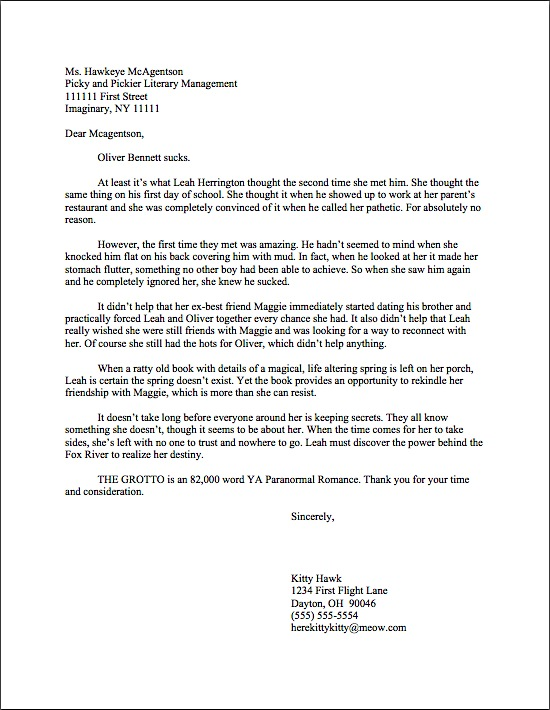
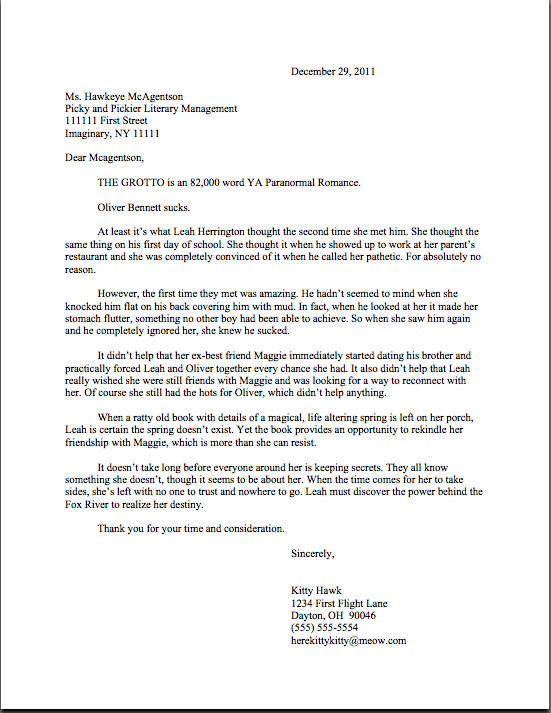
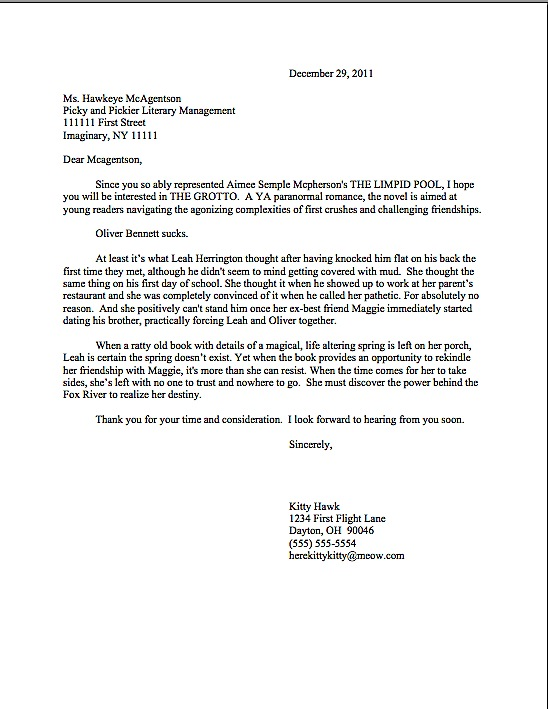
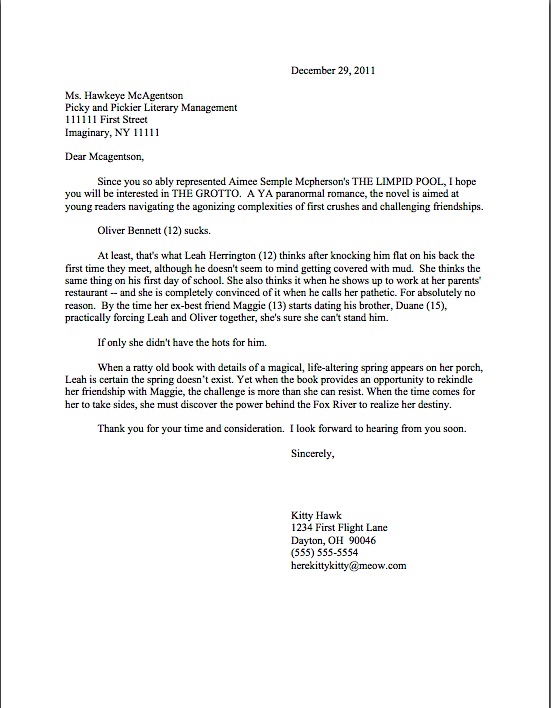
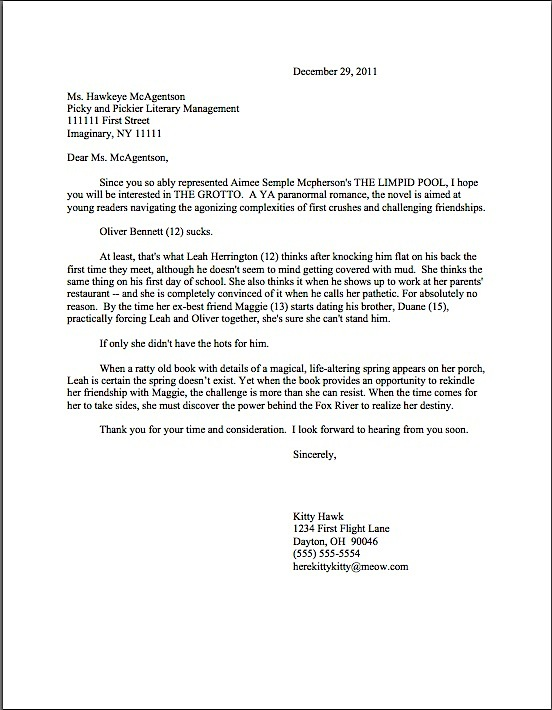



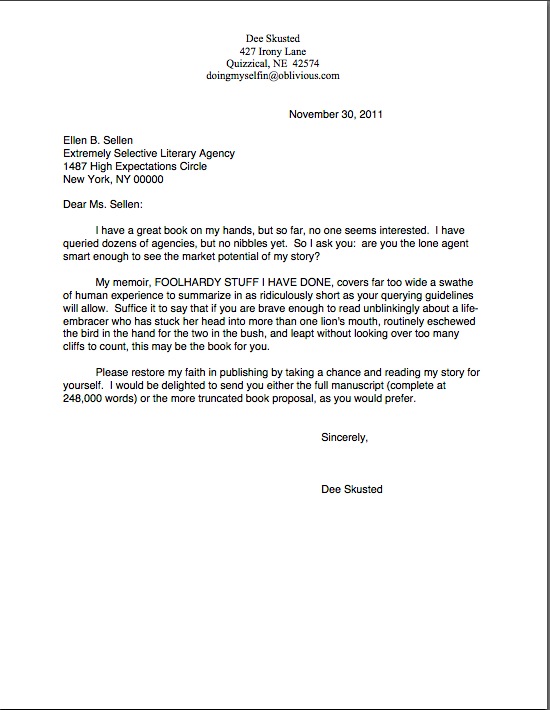
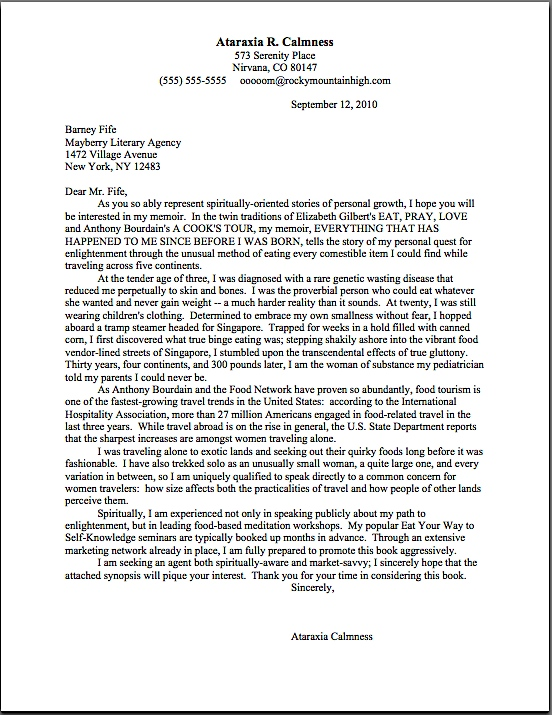
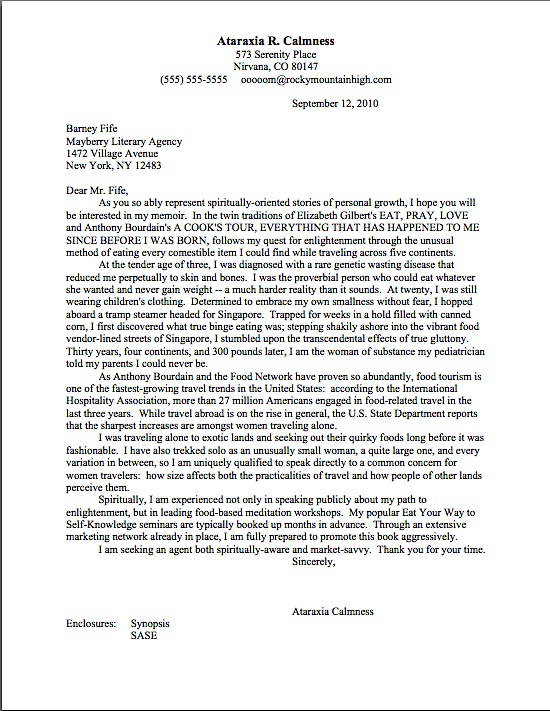
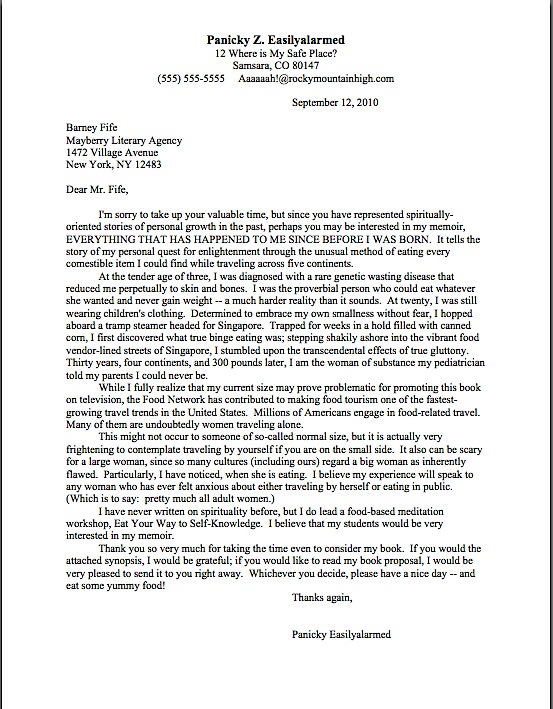
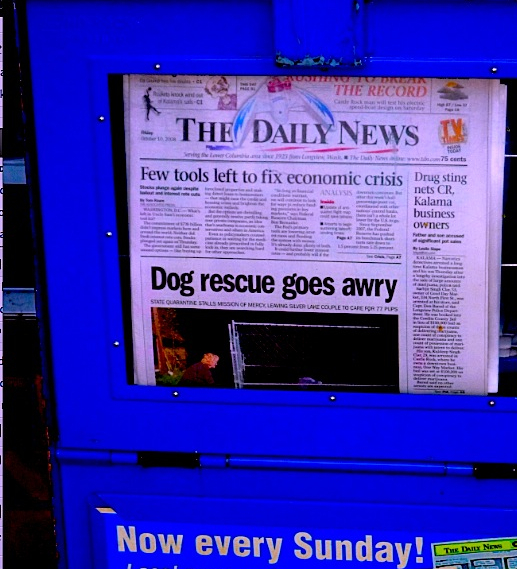
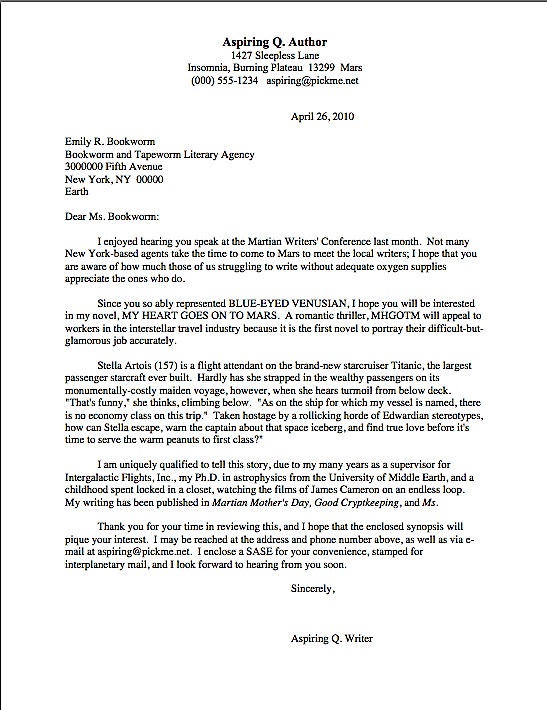
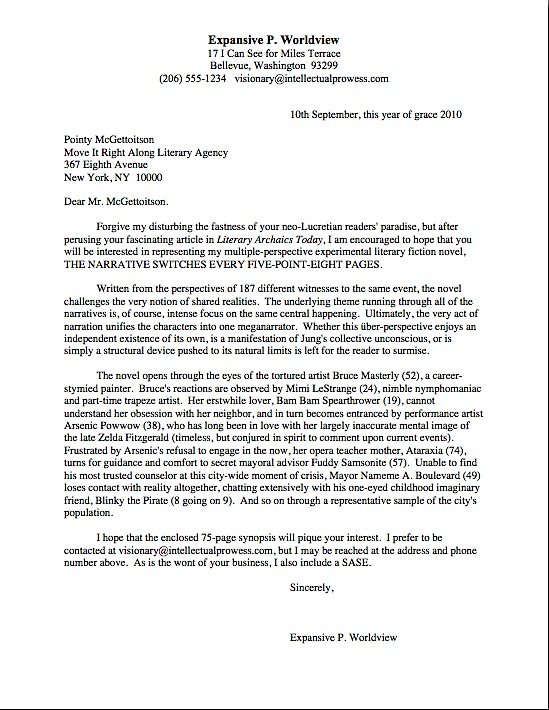

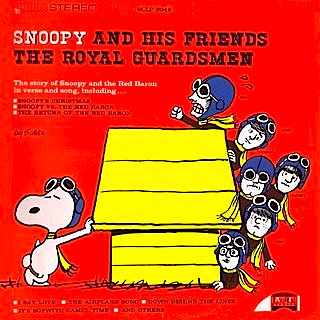
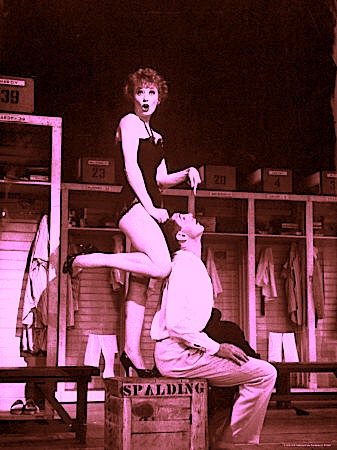



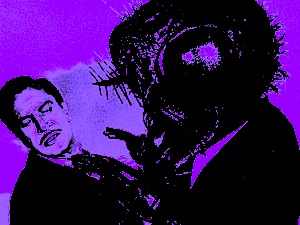
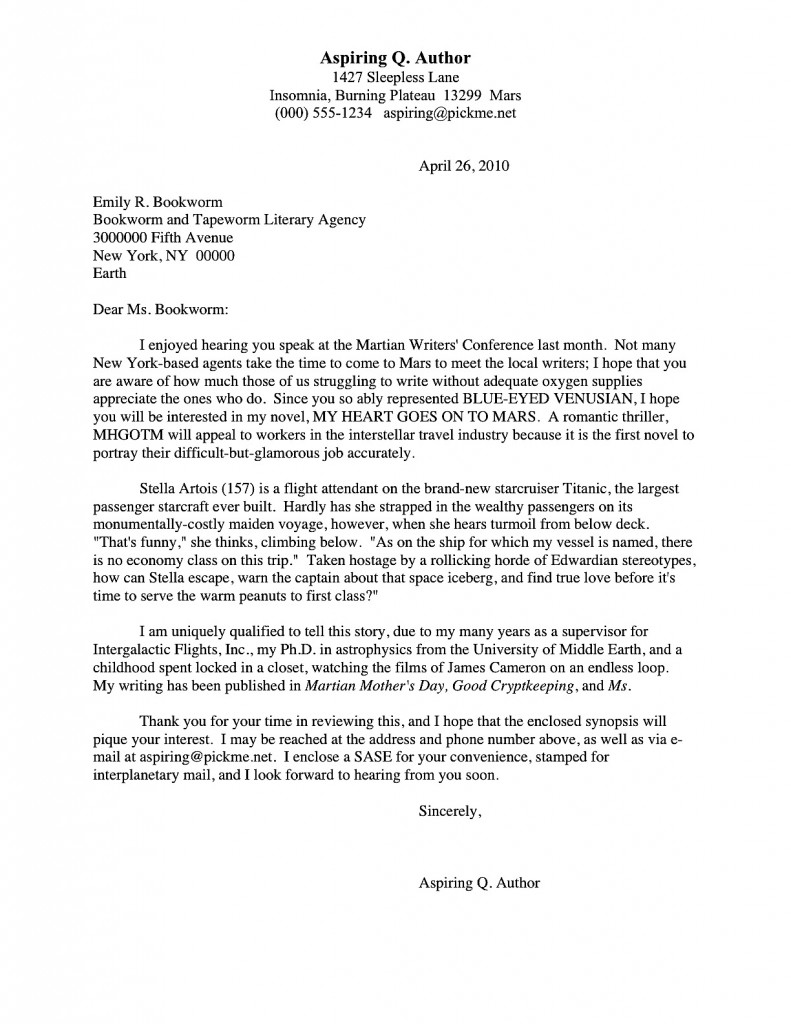
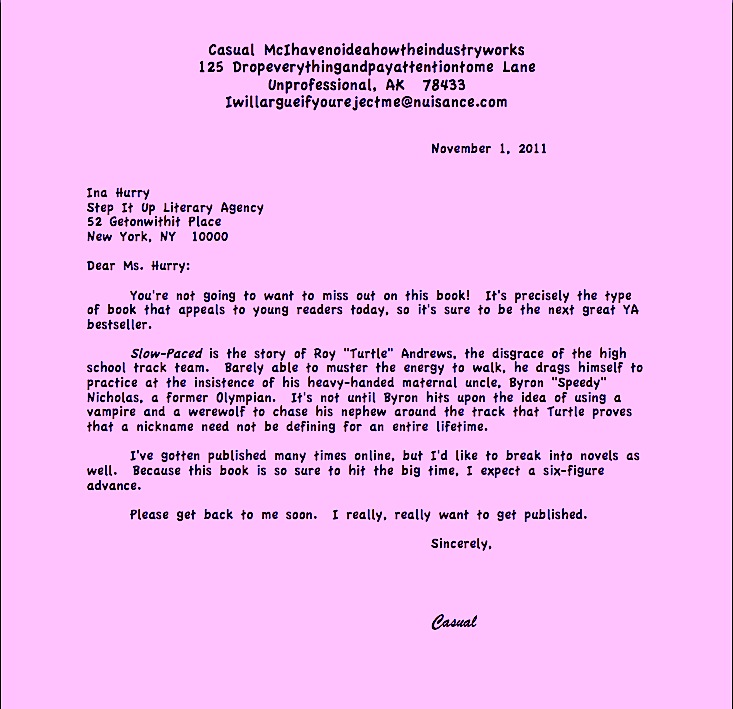

 If there is a single rule of thumb that may be applied at every stage of any successful author’s career, it’s that it ALWAYS behooves us to look critically at our own writing, rather than assuming that the only possible explanation for frowned-upon writing lies in the eye of the predisposition of the reader to frown.
If there is a single rule of thumb that may be applied at every stage of any successful author’s career, it’s that it ALWAYS behooves us to look critically at our own writing, rather than assuming that the only possible explanation for frowned-upon writing lies in the eye of the predisposition of the reader to frown.